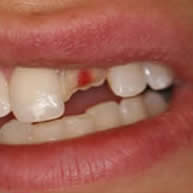Oral surgery can address a range of issues that go beyond simple tooth extraction, and the need for surgery isn’t always due to poor dental hygiene. Some causes of oral surgery, such as injuries, birth defects, or cancer, cannot always be predicted or avoided. Thanks to advances in oral surgery, especially in restoration and reconstruction techniques, many issues can be successfully treated. Below are some common reasons oral surgery may be recommended:
Tooth Loss:
To replace missing teeth, dental implants require oral surgery to insert a titanium implant into the jawbone. Implants provide a secure and permanent solution, offering a natural appearance compared to dentures and bridges. Candidates for implant surgery typically need to have adequate bone density, good overall health, and a commitment to proper oral hygiene. After healing, a crown is placed on the implant to complete the restoration.
Impacted Teeth:
One of the most common oral surgeries is the removal of impacted wisdom teeth. This typically happens during the late teen to early adult years when the wisdom teeth cannot erupt properly. Removing them prevents future dental issues.
TMJ (Temporomandibular Joint Disorder):
TMJ disorders affect the joint where the skull and lower jaw meet, leading to facial pain, headaches, jaw popping, and other symptoms. While some cases can be managed with splints, physical therapy, and medications, more severe cases may require surgery to correct the problems.
Injuries:
Trauma from car accidents, sports injuries, or other incidents can lead to broken facial bones or jaws. Oral surgery may be required to realign the jaws, wire the bones together, and repair the injury to restore normal function and comfort.
Cleft Repairs:
Birth defects, such as cleft lips or palates, are corrected through oral surgery. This typically involves a series of surgeries over several years to improve both the appearance and function of the affected areas.
Biopsy:
Oral surgery may also be necessary to remove cancerous tumors or lesions in the jaws or facial bones. This is especially critical when the cancer involves joints or muscles, as these areas are essential for normal facial movement and function.







